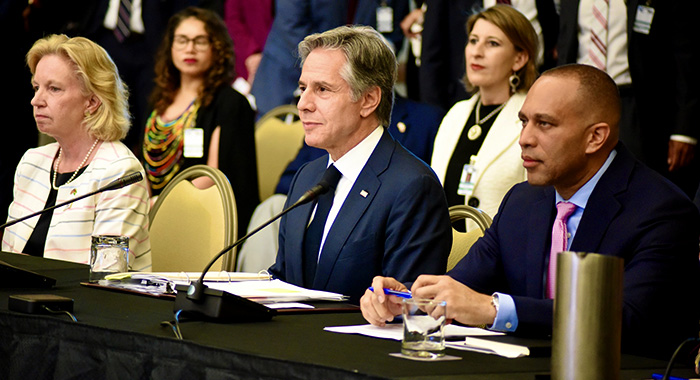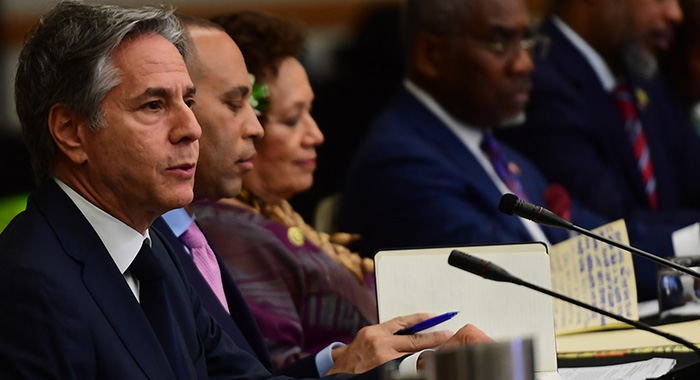By Peter Richards
PORT OF SPAIN, Trinidad (CMC) — The United States on Wednesday reaffirmed its committed to the Caribbean with Washington pledging support for deepening and strengthening cooperation at the regional and also at the international level.
US Secretary of State, Anthony Blinken addressing CARICOM leaders on the final day of the 45th annual summit, said that the commitment is even more evident as Washington joins the region in dealing with the impact of climate change, energy security, food security and access to finance.
“We recognise that as the world’s second biggest emitter…we have a unique responsibility ….to address this problem,” said Blinken, who is leading a delegation that includes the Minority Leader in the US Congress, Hakeen Jefferies.
Bliken said that Washington has been working relentlessly to avoid a climate catastrophe.
He said US President Joe Biden returned the United States to the Paris Agreement and that one of the very first things he did when he took office, was to enhance the national pledges, and he is dedicating unprecedented resources to meet the targets through the Inflation Reduction Act.
“This is, by far, as I think you all know, the largest commitment to tackling the climate crisis in history by any country anywhere,” Blinken said, noting that each of the countries of the G7 has actually adopted plans which, if implemented, “will actually help keep global warming to 1.5 degrees Celsius.
“We need other major economies outside of the G7 to do the same. Your partnership, your leadership in pressing the biggest emitters to make the necessary commitments — and then holding us to those commitments — that is indispensable. And we really deeply value the work that you’re doing on that score.”
Blinken said that Washington is also looking to build greater resilience and adaptation to climate change, while accelerating the region’s transition to clean energy.
“This is the driving focus between the partnership we established, the U.S-Caribbean Partnership to Address the Climate Crisis 2030, a programme that we launched last year to try to make energy systems cleaner, more resilient, and more affordable, like geothermal projects in Dominica and Saint Kitts and Nevis, solar microgrids in St. Lucia, electric vehicles in Barbados and Jamaica and Suriname, just to name a few examples. ”
He said with the additional US$20 million that Vice President Kamala Harris announced in climate funding last month in the Bahamas, Washington will continue to build together on those efforts.
“We’re working to strengthen disaster preparedness … .and response, improving early warning systems, developing risk maps that predict the areas that are most likely to be hit by storms, helping countries develop new tools to adapt to emerging challenges — as we did, for example, at the Caribbean Water Conference that was co-hosted with Barbados, just a few weeks ago.”

He told the regional leaders that Washington is also working to expand access to international finance, saying “this is something we heard so powerfully from a number of you both in Los Angeles and in other meetings.
“We’ve heard loud and clear that the scale and disproportionate impact of the climate crisis demands a new approach. We agree. A year ago, Treasury Secretary Yellen and I committed to work with CARICOM to make tangible progress toward the goal, not simply to recognise the problem but to actually do something about it.
“We said that we would press financial institutions to allow countries to defer debt payments in the event of climate shocks and natural disasters. At our urging, the World Bank agreed to offer debt deferment clauses in their loans by 2025. We’ve made a similar commitment in the United Stats. We’re urging other lenders to step up with us. And we also know that with new leadership at the World Bank this is an intense focus for that institution. ”
Blinen said that the US had promised to expand assistance to help governments manage the financial risk of disasters.
“At the recent global financing summit in Paris, the World Bank rolled out a disaster risk toolkit that would do just that. We’re also supporting the IMF’s new resilience and sustainability trust, which is offering concessional financing – loans issued below the market rate – to Barbados and to Jamaica. We’re pushing for access to similar financing to countries in the region that are experiencing climate shocks. ”
But he said Washington is far from finished.
“We have a lot more to do on this front. Among other reforms, we need to create financing to help countries caught another middle-income trap, which you all know very well – those not developed enough to qualify for membership in groups like the G20, and yet too developed to qualify for aid from institutions like the World Bank.
“These investments are not just necessary to protect against threats — they are a once-in-a-generation opportunity to create good-paying jobs in communities across the region. They’re just one of the ways that we’re partnering with you to expand inclusive economic opportunity.”
He said that this ranges in scale from micro loans to entrepreneurs, to macro financing for infrastructure.
“The United States remains the Caribbean’s biggest trading partner, something we’re very proud of, and for decades our Congress has given preferential trading status to key industries in countries throughout the region.
“We’re also working to advance other regional and global priorities, from championing our shared commitment to democracy and the rule of law to supporting free and fair elections in Venezuela through the Mexico City process; to transforming our region’s approach to mass migration and displacement to addressing, as you emphasised, the ongoing crisis in Haiti.”
Blinken said Washington shares the commitment felt throughout the region to help Haitian people shape their future, restore the country’s democratic order through free and fair elections.
“Haitians cannot achieve these critical goals without security. That’s why we’ve been and remain the largest donor to Haiti’s national police, why we support the Haitian government’s call for a multinational force to help its police restore security.
“Lots that we can talk about and, I know, will talk about over the next day on that front. But this is an area of intense focus for us, and we’re determined with you to do everything to help the Haitian people get it right.”
He said the United States is also committed to partnering with the Caribbean to address growing food insecurity across the region, noting this has, of course, intensified dramatically in recent years, a combination of climate change, of COVID, of conflict, including Russia’s aggression against Ukraine.
“We’re also working together to address another priority that you share, and that is to stem the rising tide of violent crime taking a devastating toll on communities across the region – especially, we know, young people – hurting local business, undercutting foreign investment, eroding the trust of citizens in their governments.”
Blinken said that Congress passed last July the Bipartisan Safer Communities Act and that this included new federal provision
“This is a tool that’s vital for holding accountable those who smuggle U.S. arms to the Caribbean. We support the creation of CARICOM’s new Crime Gun Intelligence Unit, which is improving information sharing among our law enforcement agencies and strengthening the capacity of countries to investigate gun-related crimes,” he said, adding that “just last month, we created a new position at the Department of Justice to deepen collaboration among us on gun prosecutions.
“Today I’m pleased to announce that Michael Ben’Ary, a very experienced DOJ prosecutor, will serve as the United States very first coordinator for Caribbean Firearms Prosecutions.”
CARICOM chairman and Dominica’s Prime Minister, Roosevelt Skerrit, said CARICOM regards the United States as “one of our longest and most enduring partner”.
Skerrit said the 15 member grouping attaches great value to the strong relationship, characterised by a spirit of cooperation, and underpinned by common democratic values, geographic proximity, people-to-people contact and collaboration on myriad issues of mutual importance.
He said when CARICOM leaders met with Vice President Kamala Harris last month in The Bahamas, “we reiterated the importance of this relationship and the myriad opportunities to deepen and strengthen our engagement in such key areas of trade, and investment, security, health, energy, disaster management and climate change”.
Skerrit said the Caribbean is also pleased with the resumption of high-level interaction with the United States since the Summit of Americas in Los Angeles last year and Blinken’s presence “is a strong signal that United States has kept its commitment to maintain this level of interaction.
“CARICOM is intent on working jointly with our partners to address our priorities in the short, medium and long term as evidenced by our joint efforts to address some of the region’s most pressing challenges including energy security, food security and development financing.
“We welcome the support received from United States for the Bridgetown Initiative, and we look forward to advancing the recent discussions at the Paris Summit and to working with you and developed and developing country partners alike to achieve the desired outcomes. “
But he said while “we live in the same neighbourhood,, and if there is one lesson that we can learn from COVID-19, the invasion of Sargassum, and the gun crimes wreaking havoc on our societies is that we have shared problems.
“However, while there have been discussions and we have seen and appreciate the increased advocacy on some of our most pressing concerns, we are still faced with numerous challenges which impedes regional development.”
Skerrit said blacklisting, correspondent banking and access to concessional financing based on vulnerability are still a long way from resolution, adding “we need to see some movement in these areas if we are to realise the required results”.
He said CARICOM is appreciative of the US-Caribbean Partnership to Address the Climate Crisis (PACC 2030), a framework aimed at stimulating fresh commitments to climate adaptation and resilience and clean energy programme across the Caribbean.
“This is an excellent framework which can be beneficial to Caribbean countries in our efforts to further develop our renewable energies as we combat the existential threat of climate change.
“We look forward to the US’ continued advocacy and support of our positions at COP-28 later this year in the United Arab Emirates and its commitment to be a significant contributor to the Loss and Damage Fund and play its part in helping to achieve the US$100 billion per year agreed upon at Paris in 2015 to help our countries combat that threat.”
Skerrit said that Haiti continues to face daunting circumstances as the crisis in that CARICOM country worsens.
“CARICOM remains steadfast in supporting Haitian-led solutions to the complex issues impeding the country’s development. Joint efforts with our international partners are essential to the achievement of this goal.
“In this regard, I express on behalf of the Community appreciation to the Government of the United States for its efforts in the pursuit of a lasting solution to the situation in Haiti,” Skerrit said, adding that he is “confident that our deliberations today will further enhance the very strong CARICOM-United States partnership and help to advance and enrich our long-standing relations”.






